Home | City Notes | Restaurant Guide | Galleries | Site Map | Search | Contact
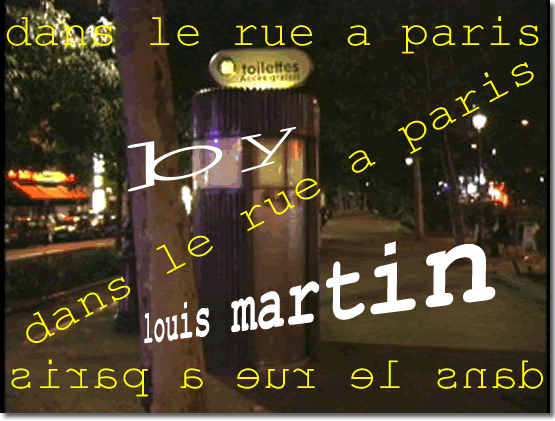
Paris—27
December 2009:
dans le rue à paris, épisode
2
Having
been kicked, insulted—called a "bitch"
for some reason, rather than a bastard—and robbed by the Arab guys
in Pigalle, I decided it was time for a break. I took the night train
from Gare Austerlitz in Paris to Latour de Carol in southern France. My
daughter picked me up and we crossed the border into Spain. In Puigcerda
near the border and in the Pyreness Mountains I relaxed for a few weeks,
walked around the lake, watching the leaves turn yellow and brown, then
fall off the trees. The colors were as beautiful as fire at night but
also depressing. It was the season of dying. I returned to Paris only
partly refreshed.
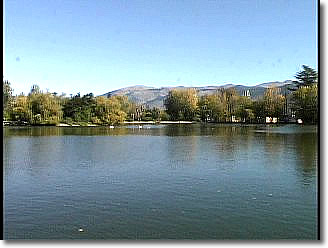
On my first night out on the street again there were five incidents. Four were minor, such as having my way blocked on the center island of boulevards Clichy and Rochechouart. Two incidents involved African guys, which is the first time anywhere I have ever had problems with Africans. I got around them but it wasn't easy. The last incident was serious. An Arab guy, who was with two friends, grabbed my bag and started to run with it. I pursued and he stopped. He then flung my bag so that the contents spilled on the walkway. I was mad and shouted, "Pick it up, pick it up." He didn't. I had a large umbrella that I had bought in China and was tempted to smack him with it. I was very angry. Earlier in the evening, down near Place Blanche, he had grabbed at my bag. But instead of hitting him, which would not have been smart with his two friends standing by, I began to yell, "Police." He smiled, his friends laughed. I kept shouting, now louder and in different directions. He quit smiling and began to walk off, looking back over his shoulder. Then he began to run. Suddenly there were guys at my side who identified themselves as police. One stayed by to ask what had happened while the other, a large guy in a knit hat, pursued. Another police officer—they were all in plain clothes—nailed him down the street. It appeared that this location near the Anvers metro station was a hotspot of trouble. But it was not the only spot. I had gotten reports back at the hostel of people having trouble clear up to Basilica Sacre Coeur on the top of Montmartre. One of my roommates, a guy from Quebec, had had trouble with an African guy who approached him wearing a mask. He demanded "everything you have." My roommate only had a pack of cigarettes, which he handed over. A large German roommate of muscular build had had two guys, one Arab, the other African, pursue him and a friend all the way from Place Clichy to the rear side of Montmartre trying to start a fight. My friend Corinne, an attractive and intelligent French girl, had had an African guy approach her in a small park near the top of Montmartre. She was there alone reading a book. He didn't do anything—she quickly got up and left—but his sudden appearance asking to see her book scared her. The whole area seemed to be more troubled than I thought. (dans le rue a Paris, part 1)
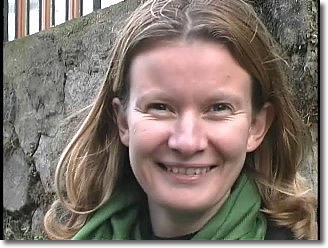
I was getting tired of the whole scene. Earlier in the evening I was down the street at Le Royal Bar, which is owned by a hard-working Chinese guy. I drop by from time to time to practice Chinese with him. Three Arab guys were sitting at a table out front getting drunk. To get the attention of the owner, who was tending bar inside, they shouted "Chinois!" (Chinaman!). Then, when one of them got up to go to the restroom, he grabbed the cell phone from the table of another customer. He smiled, then put it back. It was a kind of joke—that of some high-school twit—annoying and not funny.
It is sad, because all these
guys add fuel to the fire of France's "national identity" debate.
While you know they by no means represent all Arabs or Africans, repeated
incidents such as these sour many minds.
Late at night I had begun to drop by Le Frochot. It was open till 6 AM and provided protection from the cold and also protection of sorts from the kinds of guys who grab your bag and run. But in fact it was full of guys who would grab your bag and run—or steal your car if you had one, or sell you drugs if you wanted them—but they didn't do it there. I had been in a few times before but now it became a regular part of my late-night routine. Although your bag was safe there if you watched it, other incidents occurred at Le Frochot. One I call the Little Guy versus the Big Guy incident.
One evening there were two Big Guys at the bar drinking beer, laughing in a way that seemed more angry than happy, and of course punctuating their laughter by occasionally knocking knuckles together, followed by a slap of the hands—a very male jesture if you know it. Behind them near the door a Little Guy, ready to leave with his Little Friend, is standing up trying to put on his coat; but he is a little drunk and is having difficulty doing it. One of the Big Guys, self-appointed bouncer, walks over, drags the Little Guy outside, and smacks him in the face. What for? For being drunk? Who isn't drunk at Le Frochot? The Little Guy not only looks hurt but deeply offended. "What did I do to deserve this?" he seems to be asking. The Big Guy is going to smack him again but the Big Friend of the Big Guy restrains him. He too sees that something is not right. The Little Guy starts to leave with his Little Friend but develops second thoughts about it. His expression turns into the sad look of one who has been done an injustice. He talks with his Little Friend, who goes over to talk with the Big Friend of the Big Guy who has smacked him. The Big Friend gets a towel of ice from the bartender for the Little Guy to apply to his eye. The Little Friend hands it to him, and the Little Guy holds it to his face for awhile but I think there is still pain, though less physical than psychological now. Nevertheless he begins to leave again with his Little Friend but comes back shortly and sits down at an outside table. He has had more time to reflect upon the situation and appears more offended than before. He is now on his cell phone, and the Big Guy who smacked him is outside on the corner smoking a cigarette, oblivous to the Little Guy on his cell phone. In fact, if I am not mistaken, the Big Guy is contemplating the pleasures of a woman. In Pigalle it should not be hard to find a willing woman. Is that smile on his face really a lecherous grin? I think so.
Soon a car shows up at the corner and a Very Small Women with a Very Big Voice gets out and slaps the Big Guy and shouts names at him, none of them very nice sounding. Then a Truly Big Guy gets out of the car and pushes the Big Guy. The Big Guy backs away, dropping his cigarette on the sidewalk. The Truly Big Guy pushes him again but the Big Guy does not want to fight. He is the Little Guy now and doesn't want to get smacked. The Little Woman, along with the Truly Big Guy, walks into the bar to have a drink. The original Little Guy departs with his friend up the street. The pained expresssion is gone from his face.
A small group of guys from Cercle Theatre has formed across the street watching the incident as it unfolds. The French seem to relish fights. Maybe it is an antidote to their natural ennui. Whatever the case, for Cercle Theatre the show had moved outside. I go over and talk with one of the guys, telling him how it started. He reflects, then says, "I think you need be careful hitting little guy."
On Tuesday I met Beverly, one of thhe bartenders at Le Frochot. She was born in the United States but grew up in France and has dual citizenship. She has a low opinion of the customers at Le Frochot, especially the Arab guys. When no one at the bar was looking she showed me two large cans of pepper spray they have in back of the bar there. It looked like enough to take down everyone on rue Frochot. When I told her about my troubles on Clichy and Rochechouart, she offered to get me a small can.
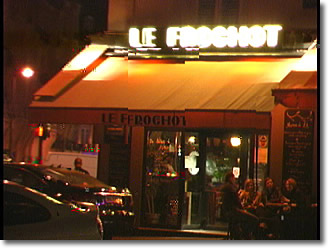
After Le Frochot closed, I went down to where Clichy curves south to Place Clichy. This was about 6:30 AM. I was waiting for the sun to come up. I am drinking a little wine, trying tro keep warm, when an Indian guy comes by and says he is looking for "sexy girls."
"I have a big one," he says, touching the crotch of his pants. "Are you looking for sexy girls too?" he asks.
I tell him no.
"It is too late now," I say. "They are all home with sexy guys. You need too look earlier."
He was not discouraged, however; he headed up Boulevard Clichy towards Place Pigalle.
I was a little surprised by an Indian guy looking for "sexy girls." Most of the Indian guys seemed smarter than this. You just lost money looking for sexy girls.
At the end of the months I witnessed a Silly Fight across the street from Le Frochot. I was sitting at the bar looking out the window when three Asian guys came flying out of Cercle Theatre pursued by several bouncers. Outside of the theatre one of the Asian guys turned around and stood his ground. There was an argument and one of the bouncers, a large Arab guy, started shoving the Asian guy. But the Asian guy stood his ground for the most part, only being pushed a few feet down the street toward rue Victor Masse. Then there was more yelling. It was obvious the theatre guys wanted the Asian guys to go away. Finally a big African guy aimed a flurry of punches at the Asian guy that drove him half way to the corner but nevertheless did not stop him. Sizewise, they were pitifully unmatched—the African guy should have been ashamed of himself—yet it appeared the Asian guy either blocked or ducked every punch. Finally the African guy kicked the Asian guy. The kick connected. Foul play! Now there was no way the Asian guy was going to leave. He got on his cell phone to call the police. And now he was back in front of the theatre, leaning casually on an automobile, and no one was trying to drive him away. He seemed invincible.
None of the clubs want the police to come. It looks bad. A female employee of the theatre, a frowsy, older blond woman—former "girl," now manager?—came out to reason with him. He pointed to his leg where he had been kicked. Reason no longer applied; he was offended. It was East verus West, North Versus South, the sun and moon and the stars awry. Men threw punches; that was okay. Cowards kicked people; that wasn't. I don't know how it ended. I left before the police showed up. Once again we had Big Guy versus Little Guy—in fact, Two Big Guys versus One Little Guy. I hope justice was done.
I walked back down towards
Place Clichy in the early hours of the morning. It began to rain. I didn't
have an umbrella with me, so I went across the street to a clothing store
and sat on the steps under an awning to stay dry. I felt like a little
old wino at this point. As a few people walked by in the early hours before
the sun came up, I looked the other way. There was a fine drizzle of rain
now and the streets were shiny. It somehow made me feel alive. I noticed
some movement on my left side. It was a mouse walking along the window
edge by a table inside La Luna restaurant on the corner.
It was cold and damp on the street but I didn't seem to bother me. Everything
had become so clear in my mind.
But it was at this point that I thought I might begin to explore some other areas of Paris as a half-homeless person. I had about worn out Montmartre and Pigalle. It was also at this point that I met Corinne, who had been frightened by the African guy in the park. She was a young French woman who was also staying at Caulaincourt Square Hostel.
One evening she was sitting at the small round table on the lower floor of the hostel eating Haricot Rouge (Kidney Beans) straight out of the can. We had something in common. We were both on a budget. Soon we were meeting a couple of times a day, eating together and comparing prices. I still have one of her receipts from Franprix. The highest priced item was for Parmentier Canard at 2.19 euros; it was also the only item over 2 euros. However, her diet was richer than mine and more expensive. I stuck to a baguette, camebert cheese, a sandwich, and a bottle of wine a day. Also, I only stayed at the hostel every other day, the other night being spent on the street and in bars and cafes, which saved some money but not as much as I thought it would. For one thing, I often bought a half pint of Vodka to withstand the cold; I also had to buy coffee or wine to stay in the bars and cafes. When I added up the overhead of my night on the street, the savings in fact were not great. I did, however, get a sense of after-hour Paris, though not the glamorous one you read about.
Corinne, by the way, is an out-of-work lawyer. She tells me there are many in France right now. She has come to Paris thinking that her chances are better in Paris. She has gone through one set of interviews for a job where their were some 2,000 applicants for the job; she didn't get it. She has an interview coming up for another job next week. The inteview lasts all day. She is prepping for it now.
"I would not bother," I told her.
In the United States I have been to interviews that lasted half the day and where you met with as many as six people. I would not do it again. This is pure torture. It is simply not necessary to meet for this long with this many people for someone to make a hiring decision. I have been on the hiring end and would not do this to someone else. Why should someone do it to me? But Corinne is a good sport; she is going through the process. She is also young and not yet disillusioned. She has a very inquisitive mind and perhaps she will learn something. She also has a sense of humor. She almost died laughing during some of our conversations. When I told her how one of my ex-roommates saved money on a trip one time, she had tears in her eyes. He and his male friend booked a single bed in a hostel and slept together.
"Sometimes the beds were very small, and it was difficult lying next to Phillip all night long. I like him, he's a good friend, but ..."
Not that funny but we're staying six to a room in bunk beds and can relate to the problem.
There was also Pete from Florida, who had worked as an executive for a Fortune 500 company.
"I don't think I would have ever quit," he told me. "I thought it was a good job."
But when he got laid off and had some time to think, he realized what a miserable life he had been living. He had money saved up and being laid off was a blessing in disguise. He was a free man now, kept a six pack of beer under his bunk, and was headed to Istanbul to meet up with a friend.
On Monday I headed over to St.
Germain and the Latin Quarter. I had wondered these districts before but
wanted to have a closer look. I had my doubts about adding anything to
the volumes that have already been written by others but who knows, I
was a homeless person—or half-homeless person, if you wanted to
be precise about it. Since I had a lot of time on my hands, perhaps I
would notice something that others had missed.
But before I get carried away, or off on my own observations, perhaps it is wise to recollect the obeservations of Martin, Candide's pessimistic travelling companion in Voltaire's Candide—a lively book containing much wisdom.
When Candide asks Martin if he knows Paris, he replies:
"Oh, yes," said Martin, "I know Paris. You will find all sorts there. It's a chaos, a mob of people all out for pleasure, and scarcely a soul who finds it ... soon after I arrived I was robbed of all I had by some pickpockets at St. Germain's Fair, and spent eight days in jail on suspicion of being a pickpockjet myself...."
I had had my wallet "pulled" several years before at Gare Austerlitz and now wore a money belt inside my sweater inside my jacket—so pickpockets were not going to be my problem unless you counted all the tourist restaurants that, effectivley, "pulled" your wallet at the cash register. But I had learned to stay out of those kinds of places. In fact, one of my goals was to discover, if I could, the opposite kinds of places in the Later Quarter and St. Germain: places that gave you value for your money and did not give you the boot with the last sip of your glass of wine or cup of coffee. I know it was not going to be easy to discover such a place or places, as I had done time in these arrondissements or districts before. What Hemingway, Picasso, and others discovered there in an earlier era has largely been turned over to the imagination of marketeers. The reputation lives on while the cafes and bars are mostly full of overweight tourists and the students of well-off parents. Still, it is a pretty scene.
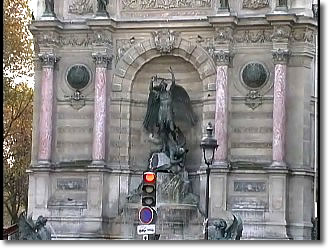
Having arrived at Place St. Michel, I stumbled east along the quai till I found myself fact-to-face with Shakespear and Company Bookstore. What a surprise. I had visited Shakespear and Company years ago but had forgotten its location. It is nicely tucked between some restaurants and the pretty garden of Église Saint Julien le Pauvre with Notre Dame across the river. I immediately notice the sign out front for City Lights Press. I wondered: Was this the City Light Press in San Francisco? I was not into asking as many questions as I used to when I worked as a reporter. I guess you could say I had become a frugal asker of questions, preferring to discover things in a more natural way. But curiosity got the better of me. I went in and asked if City Lights Press was related to the City Lights Press in North Beach in San Francisco and Lawerence Ferlinghetti. Indeed it was.
"We are friends of Lawrence Ferlinghetti," stated the young English-speaking woman at the resister whose name I purposely did not ask.
Later I looked around the shop and discovered not only Gertrude Stein's "Lost Generation" but Jack Kerouac's "Beat Generation" with "Howl" and other works screaming from the shelves for attention. I know the Beats at least visited Paris, so I did not feel especially deceived at seeing these poets and writers on the shelves of Shakespeare and Company—it was actually a kind of priviledge to be there—but I knew that they were more closely associated with the free spirit of San Francisco in the 50s and early 60s and its coffeehouses and meatball-and-pasta and red-wine hole-in-the-walls with a Pacific breeze.
I noticed that Shakespeare and Company looked older than on my last visit. It is a wooden structure among the many solid Napoleonic-era buildings and, like an old farmhouse, is showing signs of age. The stairs creak when you walk up them, and upstairs the walls moan as if they have stories to tell. Finding myself colliding with many touristy-looking visitors at this venerable old bookstore—I think it may be on the minor tourist hit list now—I decided it was time to get out. I walked across the street to the garden at Église Saint Julien le Pauvre, a 13th century Gothic church, and sat on a bench facing even-older Notre Dame. I was now among the true senior citizens of the city. Île de la Cité, with Notre Dame on its eastern end, was just across the river. It was as close as you can get to the roots of Paris.
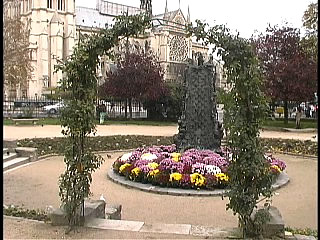
The gardens of Église Saint Julien le Pauvre are very beautiful and very well maintained, especially the little circle around the Fountain St. Julien le Pauvre. But I only stayed a little while. There were dark silver clouds in the sky, a wind has come up, and it was very cold in the late afternoon.
Later I walked down to the Seine. It wasn't any warmer there. In the early morning there was almost no one there, just a few homeless people in sleeping bags. All the riverboats that go up and down the river with cocktail-sipping tourists were docked up now and it was quiet. It was the season of falling leaves and I watched leaves drifting slowly in the river from east to west. I searched for, but did not find, any all-night places, so I spent the early hours of the morning back down by the river looking at the leaves, the stone banks, the old iron mooring loops for tying up boats, and the arches of the bridges. How did they ever lift those huge stone blocks into place? In the morning I walked back to Montmartre and spent the next day at Caulaincourt Square Hostel.
On Wednesday I was back down in
the Latin Quarter looking for coffeehouses and hangouts. I did a lot of
walking to find very little of interest. Most places were expensive and
aimed at the toursist and a quick "pull" of the wallet at the
register. Conversation between well-heeled friends was okay; reading or
writing was not.
I found one good place, however, off rue Mouffetard on du Pot de Feu: Montagne. Prices were reasonable, there was lots of space, and there was no rush to get you out. This was in a university neighborhood where you would expect to find such places but didn't. Instead there were Indian restaurants, colorful and formal looking, with napkins tucked neatly into wine glasses but no customers. The only other option seemed to be noisy pubs with beer-drinking mobs of students. Before you reach du Pot de Fer on Mouffetard there is a nice little circle of restaurants and bars, good for conversation but not for hanging out with a book. I gave one a try, however: Le Contrescape. Inside, it looked like a gentlemen's club—polished wood floors, padded chairs, lower lighting—with coffee creme at 4.70 euros and a sandwich for 13 euros. I hung out for all of 30 minutes on a coffee creme before continuing my search. No wonder so many people in Paris look angry these days. Everywhere they go they are being cheated.
I found one other place I liked down on rue des Ecoles, which parallels St. Germain to the north of it. It was a boulangerie-cafeteria called Salles au fond on the corner of des Ecoles and rue Jean de Beauvais. It had lots of space, both inside and out, with a comfortable room in the back for reading or writing or meetings. The pastry was excellent and the prices tolerable. The day I went in, three women were discussing a literary project in the back. They were there when I came in and still there when I left. In general, des Ecoles is a more "honest" street than St. Germain; your wallet is safe at the register.
In all my wanderings I found one other place of note: Patisserie Viennoiserie on L'Ecole de Medicines, a continuation of des Ecoles that curves north into St. Germain. It was crowded and noisy when I went in but it is inexpensive and has a big variety of pasteries. It is an old-fashioned kind of place that does not pressure its customers to move on when the last crumb of their cumb cake has succumbed to the fork or fallen to the floor.
There are surely other good
places in St. Germain and the Latin Quarter. There are many small places
running off rue Seine in St. Germain. But it would require more time than
a homeless person has to find them. Many mice know them, I'm sure, and
some rats. Les Deux Magots and Café de
Flore still look grand but are unfortunately too famous and too
expensive to go into. Still, it is nice standing across the street and
looking at them.
Part of the daily activity of the homeless is shopping. If you have any money at all you can go shopping. But you are not shopping for expensive things like clothes or funiture; usually you are shopping for food. Moreover, no matter how limited your diet, you can always shop for a bargain or something different. Even if you are shopping for a cheap bottle of wine, there are choices. Ditto for a sandwhich or a baguette or some cheese. Life is full of choices at all economic levels. And, fortunately, most grocery stores are not geared toward the tourist.
Shopping was also an opportunity to have a little fun. Corinne and I were now comparing prices and bragging about bargains. In fact, she had bragged to me that her can of Haricot Rouge cost her only 61 centimes. When I was shopping in the late afternoon at Franprix in the Latin Quarter I had a look at the canned-foods section. I found the same can of beans, but about twice as large, for only 99 centimes. I would let her know tomorrow that she was paying too much! In fact I worked it out: She was paying 11.5 centimers too much. Would her lawyerly mind, if it were like other lawyerly minds, knowledgeable of fees, appreciate that difference? I thought so.
I bought a sandwich for 1.99 euros, a wedge of Brie for 1.18 euros, and a bottle of wine for 1.60 euros. Then I stopped by a boulangerie for a baguette—85 centimes—and headed for the river. On the way I thought about a young man I saw earlier in the day on Boulevard St. Germain. I had been paying my respects to Les Deux Magot and Café de Flore and also Église St. Germain de Prés. He was sitting at the corner on a piece of cardboard with a paper cup in front of him and holding a dog when a police van pulled up and three cops got out. A burly cop asked him for his papers in a loud voice. The young man said nothing but reached inside of his coat and pulled out his papers. His little dog huddled inside of his coat. The cop looked at his papers for awhile, said nothing, then handed them back. The three cops got back into the van and drove off. He was a decent-looking young man and it was a little odd to see him out on the street. He looked down towards the paper cup. I walked over and dropped a euro in his cup. He tried to mutter something but nothing came out. Had poverty silenced his tongue, or had mental illness? Or had they conspired together to silence him? Whatever the case, he had drawn inward.
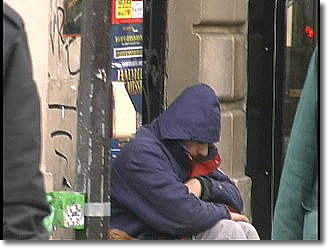
I told Corinne about it the next day when I gave her the price on the larger can of beans.
"Sixty-one cents is not bad for a can of beans," she said.
"I know," I said, "but you could have gotten them for less. Think about it!"
She seemed unphased. Then she asked:
"Where did you get them at 99?"
She told me a lot of people on the street have pets. There is a law, she said, about picking up a person with a pet. She was a little vague. Civil law was not her speciality.
If there is no law, it is probably a lot more trouble. It is one thing to put up a guy for begging on the street; it is another thing to put up his pet too. I could have researched this but didn't; it seemed more interesting to just speculate.
At this point Corinne got an idea.
"What do you think if you and I went out on the street and sat on the corner with a cup?"
I thought about it.
"Sounds like a good idea," I said. "But we'd need some cardboard. It is hard sitting on concrete and it's cold."
"Do you think we would make much money?" she asked.
"I doubt it," I said.
"We could go to the store afterwards and buy dinner."
"Or a restaurant," I said, "if we made a whole lot."
"Do you think we would make very much? she asked.
I said I didn't know but I didn't think so. I said I would start looking in beggars' cups to see what they earned.
"Do you think that beggars 'earn' money?" she asked.
I said I thought so.
"It is hard work sitting outside all day on hard surfaces."
I know. I have been sitting on a lot of benches. The sidewalk must be worse.
"Yes," she said, "but would you call that 'work'?"
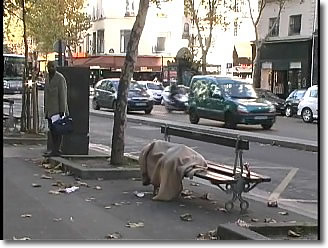
Corinne was always asking questions.
We made a date to go begging the next Tuesday.
Our conversation was the day after I was pricing her beans in the Latin Quarter. Later that day I walked down to the river with my food. But it was so cold I didn't feel like eating. I drank a little wine, however, then walked across the bridge at St. Michel to Île de la Cité, then across Île de la Cité over to Chatelet. At a sheltered bus stop on the north side of the river—the "right bank," if you want to call it that—I ate half a sandwitch and some cheese. But even there it was too cold. I took a shot of vodka to avoid the shakes, then decided to walk back to Montmartre. The walk would warm me up and if I were still cold I could go over to Le Frochot to see who was steeling a car, starting a fight, or selling drugs in the basement restroom. Le Frochot—my refuge—warm, safe, secure! My other choice was an all-night pub on rue Seine that I had spotted earlier in the day, but it looked expensive and I didn't feel like hanging out in a pub.
It
takes about an hour to walk from the Seine River to Montmartre.
I walked my usual route up Boulevard Sabastapol to rue Etienne Marcel,
over Etienne Marcel to rue Montmartre, which turns into rue Faubourg Montmartre,
then into rue Notre Dame Lorette, and finally into rue Pierre Fontaine,
which comes out on Boulevard Clichy between Montmartre and Pigalle. It
was raining when I got to Boulevard Clichy, so I hung out in a phone booth
for awhile, then decided to walk down to Place Pigalle and Le Frochot.
This was about 2 AM. But now as I come up to Place Pigalle I see a commotion.
There are about 10 or 12 guys in the street fighting. This is alarming.
I'm not in the mood for it—I never am—and it is frightening.
There is no sign of the police yet. Then one of the little white prefecture
cars shows up but they do nothing. Then two or three other vehicles show
up, including a police van. Now there are dogs out on leashes—four
of them, muzzles off, barking and pulling at their leashes. Dogs and cops
are now moving in on the combatants. One of the combatants is now down
on the ground. I think the police have ordered him down or put him down
with force—I'm not sure. The rest of the combatants, now facing
the dogs at close range, split. The fight is over. The guy who is down
is now being loaded into a police vehicle and the dogs are back in the
van. As the police depart, some of the combatants, piece of pizza in hand,
are back in the street cheering the police. I am no longer in the mood
to hangout at Le Frochot. I go back down towards Place Clichy and hangout
in the telephone booth part of the night, and on the store-front steps
the rest of it. I survive the wind and rain until morning when I can go
back to Caulaincourt Square and tell Corinne about the fight and bean
bargain.
But I begin to feel that my plan needs modification. I'm not happy hanging out in St. Germain and the Latin Quarter, but I'm tired of Montmartre and Pigalle too. I feel like I have worn out Boulevards Clichy and Rochechouart. I start wondering about the history of these places. I know some of it but not a lot. Yet I'm standing out there all day. I can almost feel it like an unknown hand reaching out and touching me. I'm in it; I'm walking through it. I see the beautiful old buildings of another era; I see the giant curbstones now sunk half way into the pavement; I see the giant slabs of stones used along the river banks, and the old iron mooring loops. I see history everywhere but I don't know it, or only a little of it. I know the literary history and some of the characters but now, suddenly, I want to know more. I'm not impressed with the kids who read the tourist hit list and run daily to this monument or that cemetiere or those catacombs ...
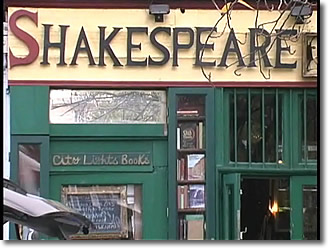
I made a trip to Shakespeare and Company to see what they had on the history of Paris. They had a book or two but they were beyond my budget. I had also researched the history of Paris on the Internet and found a few interesting pages. But I wanted something in hand that I could read anywhere and digest. The solution? Print some pages from the Internet. I found 13 Wikipedia pages that I printed at Cyber Discount on rue Pierre Fontaine for 2 euros. They were what I needed, not an expensive book that would add weight to my bag at the airport. They zipped through early history, the Romans, the Early Middle Ages, while concentrating more on Medieval and modern history. With the Bourbons things got interesting. With Voltaire, the French Revolution, Napolean, the 19th century and the Industrial Revolution ... things became fascinating. I already knew about the occupation and World War II but there were details that I did not know. For instance, that Hitler had ordered that Paris be reduced to rubble when the Allies broke through German lines and were close to liberating it and that his commandant in Paris, von Cholitz, had refused the order, not wanting to be remembered as the person who destroyed Paris. There was lots of other stuff I knew nothing about.
About the same time, partly due to conversations with Corinne and others, I had become curious about some of the people passing through and staying at Caulaincourt Square Hostel. Some were a curiosity; others were downright strange. A few like Cédric, an African guy from Dijon, were absolutely delightful. Some were an absolute pain in the neck. And it was a completely international mixture of people, most young but some older, a few even old. And all, to some extend, had been affected by the "Great Recession" or whatever you wanted to call the state of the economy. With a range of people in various conditions, it brought to mind the Canterbury Tales by Geoffrey Chaucer.
There were people like Dan, one of my
roomies, a laid-off restaurant worker from Seattle. He was a good-looking
but rather raw young guy who agreed with you a little too easily no matter
what you said. And there was the Fin, huge and muscular—he seemed
to fill up the entire room—who came in one night with a six pack,
said not a word, and began to drink it, one bottle after another, then
went to bed. He reminded me of the Cyclops Polyphemus, drunk on beer rather
than wine.
Then there was the guy from New Jersey who was loud and obnoxious. Corinne and Dan and I were sitting in the lower room talking around the small round table after eating dinner when the guy from New Jersey finished up whatever he was doing at a computer nearby. Corinne, always the questioner, made the mistake of asking him what he thought of Obama.
After Obama received the Nobel Peace Prize, people were beginning to question Obama; and Corinne was beginning to question people who were questioning Obama.
"Well," he said, his voice beginning to rise, filling the room and the hallway and maybe even the lobby above, "I'm not really into politics but ..."
He never stopped until he had told us that John McCain seemed like a pretty okay kind of guy—16 or so cars and all—and that Sarah Palin got a bum rap from Oprah, and gun-control advocates were a bunch of idiots ... When I pointed out that most home owners with guns, if they used their guns on an intruder, usually shot a son or a daughter sneaking home from a secret date—sometimes a spouse—he rambled on, working into his monolog, some five or ten minutes later, that parents should always know where there children are—issue addressed, I guess. Never was there a pause for comment; it was a monolog rehearsed mentally, I suppose, in spare moments—on the toilet, in the shower, stuck in traffic—and now being played back for our edification. When it looked like it would never end, I got up and left. Corinne, who had asked the question, stayed to listen, and Dan, always agreeable, agreed several times but I don't think the guy from New Jersey noticed. He was truly unbarable but a rather typical male specimen from New Jersey, I'm afraid.
There was also the attractive young woman with long dark hair who wanted the electrical socket I was using for my laptop. As soon as I put my laptop into standby mode, she asked if I were finished. I told her no, that I didn't have the battery in my laptop and I would lose everything if I pulled the plug. I pointed out the many other available electrical sockets—in the room we were in, in the hall outside, in the lobby upstairs, and even in her own room. She was not happy. She wanted the socket I was using. She left but half an hour later she was back standing on the stairs asking if I were done.
"No," I said. "There are sockets everywhere—there, there, and there," I said, pointing at them.
She wasn't happy. She wanted mine.
Another day I was talking with a young woman, Maritza, from Columbia. The attractive young woman stood on the stairs looking down at us. Maritza finally looked up at her.
"Do you want to sit down?" Maritza asked.
There were three chairs, the one to the left of us empty.
"Yes, but I want the chair you are sitting in," she said.
I don't know what was wrong with her. Maybe too much pressure in her life.
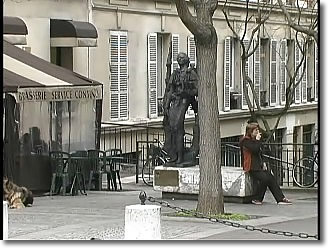
Later on Corinne told me about one of her roommates who demanded that the lights go off at 7 PM every night. She was sleeping all the time. When Corinne turned on the bathroom light and cracked the bathroom door so that there was a least some dim light in the room to see by, the woman demanded that it be turned off as well. Corinne and her roommates took to gropping around in the dark when they needed anything or went to bed.
At first I did not mention strange roommates—either to Corinne or anyone else. When I finally did, mostly for humor, the stories came out. And a pattern seemed to emerge: Four out of five roommates were fine. But one out of the five was either odd or had flipped. Why? I think the answer may be this: There were a lot of people out of work and a place to live and they were filling up the hostels. This was certainly true of Corinne and me and Dan and Pete. Some of them were not used to and could not adjust to living with five other people in a small room in a bunk bed. They were used to privacy and peace and quiet. Crammed into a small space, unable to think clearly in some cases, and sharing a bathroom with five other people and sometimes more—not all the rooms had bathrooms—they were losing it.
The guy from New Jersey I think would be obnoxious anywhere and in all circumstances, but I wonder about the young woman who wanted the electrical socket and the occupied chair. What had happened to her mind?
There was also the guy who was thrashing around all night in his bed and kicking the wall, then getting up at 4 or 5 AM to play games on his computer. I think he was German but I don't know. He never said anything more than "I don't speak English" when someone asked him a question. One time he threw the windows wide open on a cold, windy night and sat there on his bunk without a shirt on.
There was also the guy from Australia with the long bushy hair and sharp, pointed nose. He looked like a scarecrow. He would show up when everyone was settled down reading or engaged in a quiet conversation and find some unsuspecting couple to start a conversation with. It was a pattern that I observed a number of times. The conversation always began the same way, breezy and off the wall.
"Where you folks from?"
Told, the next word was "awesome."
Whether they were from Hong Kong, Singapore, or Stink Hole, Kansas, the response was always the same: "Awsome!"
But he was even louder than the guy from New Jersey. Until he was gone, all thought, all work, and all other conversations stopped.
Usually he picked two very nice people, a young couple who did not seem to mind him. Perhaps they were new on the road and needed a sense of rapport. By the end of the conversation, however, they looked exhausted.
When it came to discussing favorite places, his was some bar in Barcelona where you bought your drink inside, then drank it in the street outside, everyone getting plastered. The experience was of course AWESOME. Getting up a 3 PM the next day with a hangover—that too was awesome, I suppose.
Serial compulsive socializer (SCS)? Something like that. He wouldn't have bothered me so much if he were not so incredibly loud. Why are such little people—"pimp squeeks," as they used to be called—endowed with such loud voices? Compensation, I supose.
There were other curious characters as well.
One other character type stands out at the hostel. Many of the younger generation had an addiction that seemd to me worse than alcohol, worse than drugs—even heroin—even worse than the type of sexual slavery described by Somerset Maugham in Of Human Bondage. Poor souls, they were total Internet addicts. It was as if they lived and experienced their lives on the Internet. Everything was planned on the Internet, executed in an uncomfortable reality zone code-named "Paris," then recorded on the Internet—Facebook, blogs, Twitter alerts ... As soon as travelers returned from a day's "exploration" at the Catacombs, Le Louvre, The Pantheon, Le Jardin des Tuileries... fingers fluttered over keyboards for up to two hours. The hostel became a typing pool. No wonder there is no news these days with so many "citizen journalists"—or if there is news, it cannot be found among the millions of words typed non-stop and without pause for thought or correction. To walk out of the hostel in the morning, to head down some unknown street, to discover whatever was there, to have a drink in a bar or brasserie that has not been recommended on a website, to talk with an unknown person—l'étranger—was simply not conceivable.
On Saturday, in pursuit of Paris history, I decided to take a walk around Île de la Cité, a place rich in early Paris history. Île de la Cité, if you don't know, is the western island in the Seine with the Notre Dame at the east end. I decided to start in the middle at Pont St. Michel and walk the retaining walls in a clockwise direction.
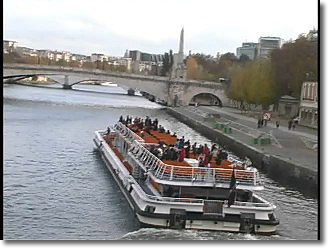
Saturday was a cold, windy day with some rain but it did not stop all the tourists. In fact, walking along the quai it was so cold that I had to nip at my bottle of vodka to stand it. The park at the east end was worth it. I descended the stairs at Place de Point Neuf and, ducking under the branches of some trees, walked to the very tip of the park and the island, looking at the river joined together with the wind blowing in my face. Then I walked west along the northern quai till I came to a docked river boat. I walked out on the boat to the bar, looking at all the bottles and thinking now nice it would be to have a real cocktail if I had money. Ah, yes, I would come back. Another time I would come back for gin and Campari, shaken and cold and poured into a martini glass. Then I walked the northern quai to Boulevard du Palais where all the flower shops begin. They were as colorful as the bottles in back of the bar and there were seagulls perched along the wall. It was nice to see seagulls rather than pigeons. I had seen enough pigeons on Boulevard Clichy, feeling on the scraps of food along with the rats before the morning cleanup crew arrived (dans le rue à paris, part 1), that any other bird was a welcome sight. Continuing on I saw restaurants in the inner, open courtyard of the island. Another time, another time! Then I was down at the western end where, after having my bag checked, I descended the narrow staircase to the memorial for the French killed at the Nazi death camps. Was this one more piece of the hoax, as Iranian president Ahmadinejad has suggested that the death camps were? Not likely. With the river flowing down below and splitting into two parts, and a silence that can almost be heard, it is a solemn reminder of the deep fallibility of man.
Back up on top, I walked over to the park at the south-east end of the Notre Dame. It is a beautiful little park with many trees and benches. The leaves were turning yellow and brown. I sat on a bench and watched the sun going down in back of a swirling bank of silver clouds, some dark, others light. The ending to my walk around the island was warmer and happier than the beginning. I took an ocassional glance at the Notre Dame with its "flying buttresses" that I had read about. It looked old, brittle, the flying buttresses a little silly. The trees and the color of the leaves, with the setting sun, even though in decline, looked fresh and alive. I sipped a little vodka from my bottle and felt the glow of the sun in my stomach.
Later on I walked back to Pigalle.
It was very cold. At 5 AM I was at Le Frochot, trapped at the end of the
bar but out of the cold. I began to wonder about all the bordellos on
rue Frochot. In front of each was now a tall African bouncer. This was
not necessary. These are peaceful places off Clichy with few clients ever
but with clients who have money. They are usually older guys. Was this
then part of some turf war in Pigalle? Did it have anything to do with
the big fight I witnessed the other night?
I mentioned it to Corinne two days later—I was so exhausted from the cold that I stayed at the hostel for two days—but she did not seem very interested. A guy had asked her to a concert but with the expectation that she would pay for her own ticket—45 euros. She wondered what I thought of this. She said she had never gone on a date before where she paid her own way.
"Well, that's not the usual pattern," I said. "I always pay."
Then I remembered an exception to that and told her about it.
"I once had a girlfriend who, if the bill was really small—like for a cup of coffee—would announce grandly, 'My treat!' Never, of course, when the bill was big."
She laughed but continued to question me.
"What do you think?"
"Well, I don't think it's necessarily wrong. It's just not the ususal pattern. Mating behavior is usually a ritual across all species."
She laughed but I continued seriously:
"Usually the guy pays the bill and the girl combs her hair and puts a ribbon in it."
She laughed again but didn't look comfortable.
"Well, I guarantee that if we go out, I will buy the beans."
She smiled a little but didn't look happy. I hadn't answered her question.
One of my roommates is a delightful guy. His name is Cédric. He is a tall African guy from Dijon who stays at the hostel every week or so. He travels around as a trainer for a company that makes beauty and fashon products. He is a spiffy dresser and a buoyant person. I don't know where he gets it but I suspect it runs in the family. I think his people just prefer to feel happy rather than sad, good rather than bad, so that is what they do. But he is not a superficial person. We had a discussion one time on sales. His job is partly sales, because if the training is successful it leads to sales. He admitted that the bottom line was money.
"I make some money," he said in an uncharacteristically low-keyed tone of voice. But he said, his voice now rising, he enjoyed working with people.
He told me he used to work in marketing strategy. I know both marketing and sale, though I am not good at either; and I know that marketeers get respect whereas sales people don't.
"A lot of people don't respect sales people," I said. "But the quickest way to find out if a new product is sellable is to bring in a sales person and ask them, point blank, 'Can you sell this?' Forget marketing, just ask sales."
Of course in a bad economy it may be hard to sell anything, but Cédric said beauty products were still sellable.
Cédric was stylish or
Blanche |
I had picked up this word in a language exchange with Hye-Kyoung. Hye-Kyoung is Korean but came to Paris twenty years ago to do her masters degree in linguistics. But she says she hated it.
"It is not like the sciences," she says. "There are lots of systems and they are not integrated."
She is married to a French guy who does not speak English and she wants more practice in English. She works as a translator these days—French to Korean. But she says she doesn't have much work now because of the economy.
"To save money they just hire a student now."
Such is the way of business. "Quality" is the slogan but profit the bottom line.
She says the opposite of blanche is plouc and asks me what the English is for that. I can only think of "frumpy"; later I look it up and find "dowdy" is the best equivalent. I send her an email.
That is what I am these days—"dowdy." With holes in my pants and old sweaters that have lost their shape, what else can I be? But I used to be a little blanche in my San Francisco days.
But Cédric is blanche. He wears a fedora, a tailored jacket, and colorful muffler or scarf. It is nice to see it. And it is matched by good manners and gracefullness.
Later I mention this to Corinne. We are beginning to develop a library of personality characteristics.
I got distracted by one of my roommates,
Luke from Australia, on Tuesday while checking out of the hostel. He asked
me what I did and I told him I was a writer. Maybe I should have told
him that I was a retired plumber.
"This is the first time I have ever met a writer," said Luke beaming.
I told him it was not a good business these days but it didn't discourage him. I could hear the next question coming.
"What do you write about?"
I should have told hime cob webs and butterfly wings but I don't think it would have stopped him.
I briefly told him that I write about anything and everything. I had no limits anymore with all the blogs of unskilled writers and politicians filling up wordspace, mindspace, yourspace, and allspace with ideas on this-that, this-that, this-that, like the ticking of a clock, like the thinking of the flock, accompanied by photos and videos from their iPhones to prove that they, like good apples, had been there, done that. But it was futile. Luke wanted to know more. Somehow I managed to pack up and leave. I stopped by my locker in Pigalle to store stuff, then went over to La Formi and found an empty table.
When it is not too busy, La Formi is a nice place to reflect. It is hip and old with a long bar and I would bet a storied history. The wait staff is not trained to be friendly, they are what they are. When they get to recognize you as a regular customer, they show it but without gushing. It is just a look of recognition. Late in the afternoon and late at night, it is too popular to go into. It attracts too many "offbeat" characters who are not really offbeat at all, being mere imitations: ratty blue jeans, sports coast, hair combed at odd angles. Before the late-lunch hour when mostly business people, dressed like the artists they would like to be, show up, it is very nice.
I thought about an article I had read the night before called Broader Measure of U.S. Unemployment Stands at 17.5%. New data had been released by the U.S. government that included contract and temporary workers. Many workers in the U.S. fall into those categories but that had not been reflected in unemployment figures before. The report stated that unemployment was even higher in states like California. Previously the government reported much lower figures, around 10%. Government, like buisness, does not like to report figures that make it, government lood bad. But anyone out of work knows that things are not good, and anyone seriously looking for work knows that it is nearly impossible to find.
I had Corinne's shopping list in my pocket and got it out. Looking it over, I saw she had bought 12 items. She was shopping in quantity and storing it under her bunk. She was also taking a chance and putting some items, once they were opened, into the hostel refrigerator. I had done that with a wheel of cheese—had even boldly labelled it with my name. The next day it was gone. Maybe she could afford to lose food; I couldn't. Anything I bought I kept with me until it was consumed. It was fine if you were among the 80% who had work; if you were not, you had to watch out for the 20% who did not. Some were not above stealing.
One item that I was not completely honest about was vodka. If you were going to stay out on the street all night, it, or some other strong alcoholic beverage, was necessary. Otherwise the cold would make you miserable. I think about the "nice" people who don't understand this. They think that all street people are alcoholics looking to get buzzed. Not so. Some just need internal heating.
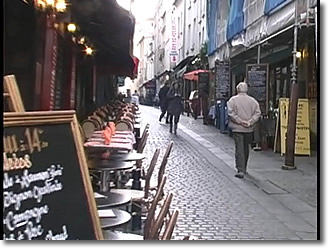
Later on I went to Gilbert Jeune bookstore at Place St. Michel and bought, for only 2 euros, a copy of Le Verrou by Guy de Mauppausant. I also went over to the Cluny Museum, which had been advertising a free show. They were closed. I wandered up the hill to rue Mouffetard and to Montagne on du Pot de Fer and read de Maupassant. But I couldn't get into a story about a club of "celibate" old men who had sworn off women. It might have interested me more in English, since I wouldn't have had to look up words. In French, however, the added labor of looking up words made me feel that the story was irrelevant, at least to me. Would it inspire me to give up talking with Corinne, or other women at the hostel? I don't think so.
I killed time by going down to the river for awhile, thinking about the bartender at Montagne as I walked down. He was another character, another personality that I could add to the managerie I had been studying. He was a case of "hyper"; everything he did was jerky, exaggerated, excessive. He even played the music so loud that one customer, trying to have a conversation with another, asked him to turn it down.
Down at the river it was cold
but nevertheless calming. I walked the lower quai along the right
bank, then had a fortifying shot of vodka and walked back to Pigalle.
At about 2 AM I went into Le Frochot to keep warm.
At the right side of the bar, in the corner by the window, I started talking with a guy with a military haircut—short on the sides, almost shaved, long on the top. This was currently a very popular haircut in Paris, at least where I hung out. It was especially popular with the Arab guys, who all looked and acted as if they were prepared for combat. But the guy I was talking to was not Arab; he was not a put-on. His name was Gilles and he had come back two days ago from a tour of duty in Afganistan. He was a member of the French Special Forces.
"I'm proud of what I've done," he insisted, "but I want out now."
He said he had a new wife from Malasia and a baby on the way and wanted to "be there for that baby."
He said he was married before and had three kids but it didn't work out because he was gone all the time. He said he wanted this marriage to work out.
He was very nervous as he talked.
"I have bad dreams all the time; I can't sleep. But she says she can put up with me."
He is a career guy—20 years in the Special Forces, fighting in Somalia,Yugoslavia, and more recently Afghanistan. His father was a 20-year veteran.
I say I thought there were just peace-keeper forces in Somalia.
"No," he says, "it was a war. When you send in Special Forces it is a war."
"I did, what do you call it? corp-to-corp combat."
"Hand-to-hand," I say.
"Yes, I did that. I killed three people one time with a dagger. Finished them off."
Now, he said, he had bad memories but was proud of what he had done.
"I've killed Africans, I've killed Arabs. I'd kill everyone of them if I could."
He pointed a make-believe automatic weapon at the Arabs at the bar.
"I hate them all," he said. "In Somalia I saw African soldiers rape and kill young girls. They cut them here"—he indicated up between the legs—"then cut their throats. I wanted to kill them for that, but they wouldn't let me," he said, looking down.
By "they" he meant the French commanding officers. By "them" he meant African soldiers that he fought along with. Clearly he needed help dealing with his experiences. Clearly the solution was not killing all Arabs and Africans.
"A lot of people have trouble coming back from wars," I said. "Have you read about the 'Marlboro Man'?" I asked. "He's a hero but mentally a mess."
Yes, he had heard about him. He said a lot of guys are like that.
"I am crazy at times, a mad man," he said. "I wake up in the middle of the night sweating ..."
Despite my recent negative experience, I couldn't go along with his racial hatred, but I was sympathetic. I had read a lot about the problem. I remember that a women I used to work with said that her husband used to run to the corner of the house every time a helicopter flew over. He had done a tour of duty in Vietnam. I also knew that help was difficult. There were too many who needed help and too few who asked for it.
"Most guys," Gilles said, "end up in a bar talking about it."
He did not sound hopeful.
I wondered: Was he that much
different from some of the people in the hostel? Was the pressure just
greater in his case?
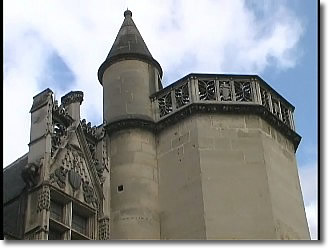
As it turned out, this was the
end of my tour of duty on the street. I had a little more money now—some
family money showed up—and I stayed in the hostel for a week before
going down to Puigcerda again to visit with my daughter. Also, there were
some other things I wanted to do in Paris than just hang out on the street.
I did want to try it on the street as a beggar with Corinne. But she chickened
out. We set a date—the following Tuesday—but when the date
came she showed up late and looking uneasy. I let her off the hook. I
did begin to look into beggars' cups after that to see how much they "earned"—it
wasn't much. I also wanted to go to the free art show at the Cluny. It
turned out not to be free on the day I went when they were actually open.
It cost me 8 euros—my request for a "senior" discount
only got a smile from the guy at the ticket counter.
The show itself was disappointing. The Rembrandt show that I saw advertised along Boulevard St. Michel was not there. The permanent gallery consists, as far as I can see, of religious art of the Middle Ages. The museum itself is dimly lit and gloomy. There were of course exceptions. The sculpture as you walk in from the bookstore is appealing. For instance, St. Anthony Hermit and St. Barbes have beautiful lines, or curvature, to them. One piece upstairs, Huile sur bois by Adriaen Isenbrandt Bruge also grabbed my attention but probably not for the reason for which it was commisioned. It was the beautiful bay in the background, along with the woods, that appealed to me. The religious symbolism I can do without. I wondered about one thing. When I was there in the early afternoon on Monday there were many school tours there with young kids. How could this art possibly appeal to young kids? How could they possibly understand it? With so much other art in Paris, why a trip to the Cluny museum? This is a tough one even for adults. Period-art scholars of the Middle Ages I can understand, though I would not want to be one myself.
I forgot to take water on my trip to Cluny—maybe that accounts partly for my grumpy report—and, having paid 8 euros to get in, I decided to forgo buying any. I walked all the way back to Montmartre thirsty and feeling dizzy.
I also made a trip to the Louvre. Here I scored big time. I spotted two discount nights each week: 6 to 9 PM on Wednesday and Friday. I went on Wednesday and did not do what so many do: try to see everything. I simply walked a small part of the museum. I was not in competition over my space on "Facebook"—I had none—and was not planning to put out a news alert about my trip on "Twitter." I wouldn't know how if I wanted to. Sad, I know.
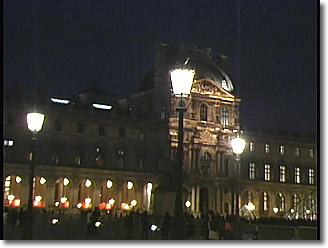
But I did enjoy the show, or what I saw of it. First of all, it is spectacular walking up to the Royal Palais at night. It dazzles the senses as does a magic show or fireworks. Inside you can see the chambers of Napolean III and live in a world of actual glitter that you will never experience in a virtual-reality show or see under the bridge of the river Seine; you can see an enormous show on how the Louvre was made and when, and having done that or not, ancient coins, Egyptian mummies, the busts of great men, giant paintings of passionate battle where even the eyes of the horses bulge with rage and men fight half naked and half submerged in rivers ... And for awhile you can get off the street and out of the rain and feel human for awhile.
Home
| City Notes
| Restaurant
Guid | Galleries
| Site Map | Search
| Contact